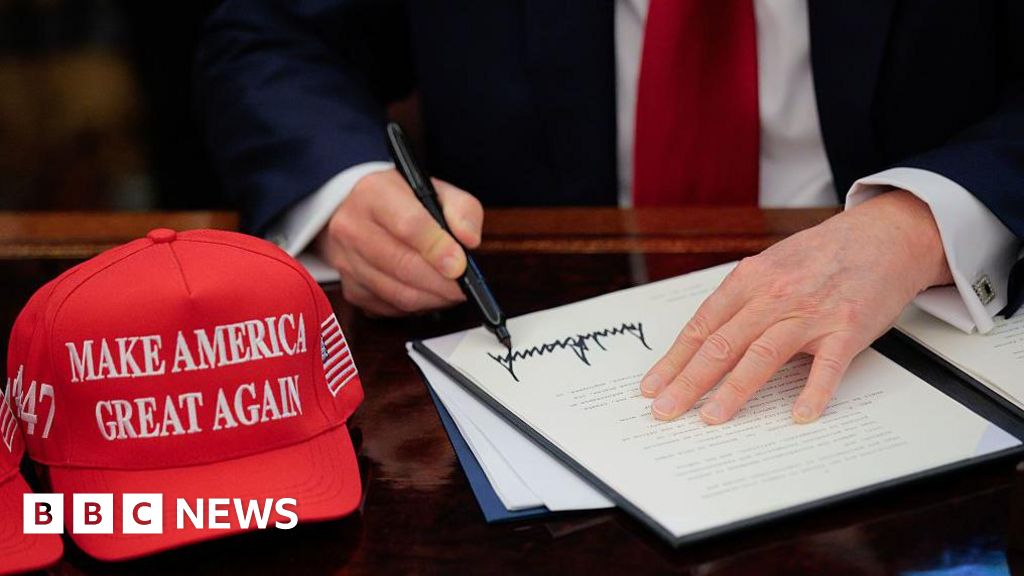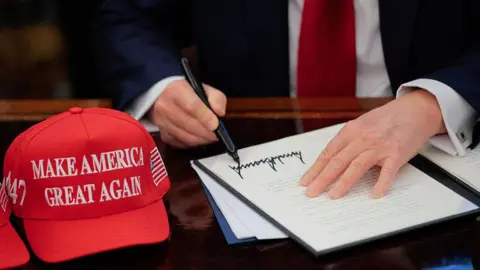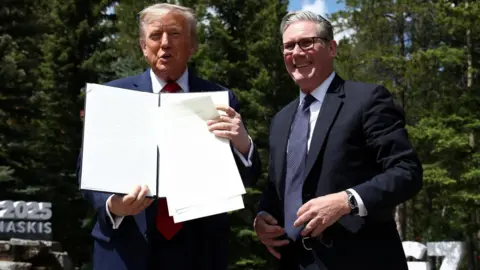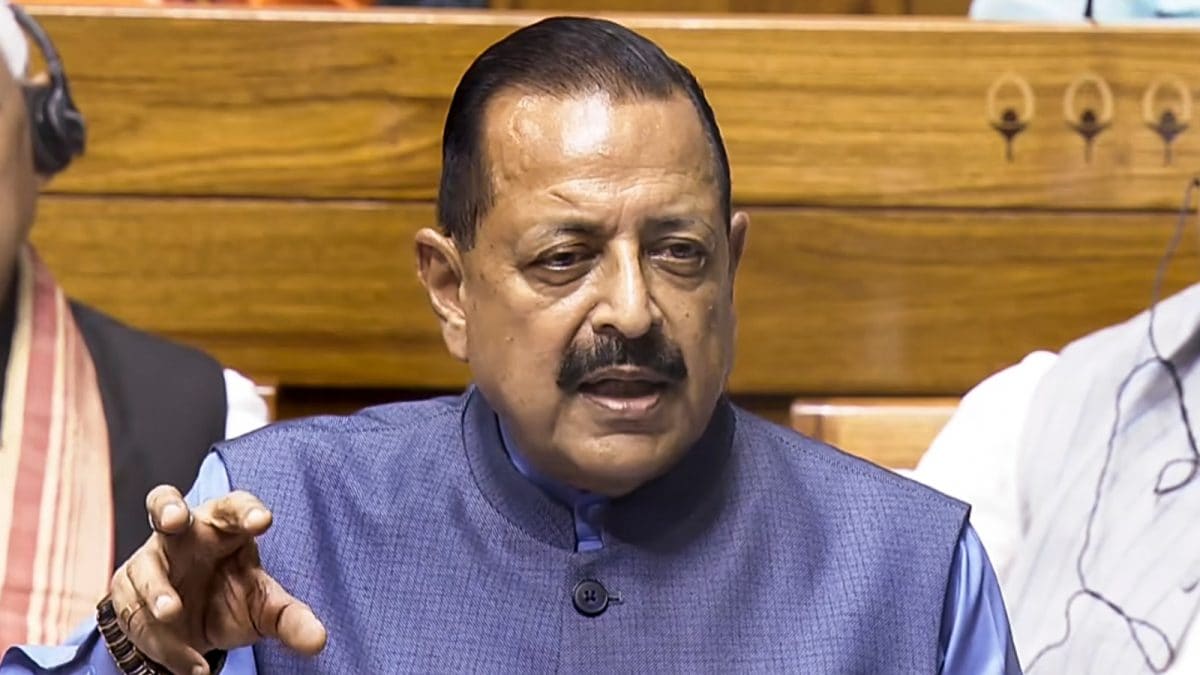Business
Semicon India 2025: PM Modi receives first made-in-India chip; industry leaders hail nation’s role in global ecosystem – The Times of India

Prime Minister Narendra Modi on Tuesday received the country’s first made-in-India semiconductor chip at the inauguration of Semicon India 2025 in New Delhi. Union IT minister Ashwini Vaishnaw presented the Vikram 32-bit processor, developed by Isro’s Semiconductor Lab, along with test chips from four approved projects.
According to news agency ANI, Vaishnaw said the achievement reflects the country’s rapid progress under the India Semiconductor Mission launched in 2021. “Just a few years ago, we met for the first time to make a new beginning driven by our Prime Minister’s farsighted vision. In a short span of 3.5 years, we have the world looking at India with confidence. Today, the construction of five Semiconductor units is going on at a rapid pace…We just presented the first ‘Made-in-India’ chip to PM Modi,” he stated.Vaishnaw added that despite global policy turmoil, India has emerged as a “lighthouse of stability and growth.” The Vikram processor, fully indigenous, has been qualified for use in harsh launch vehicle conditions, ANI reported.The minister highlighted India’s semiconductor ecosystem push, including the Rs 76,000 crore Production Linked Incentive scheme, of which nearly Rs 65,000 crore has already been committed. He also referred to the Outsourced Semiconductor Assembly and Test (OSAT) Pilot Line Facility launched in Sanand, Gujarat, with CG-Semi expected to roll out chips soon.As per ANI, the government has sanctioned 23 design projects under the Design Linked Incentive scheme, while 10 semiconductor manufacturing projects worth over Rs 1.6 lakh crore have been approved across Gujarat, Assam, Uttar Pradesh, Punjab, Odisha, and Andhra Pradesh.Industry leaders also hailed India’s growing role. Tim Archer, CEO of Lam Research, said India is laying the foundation for a “resilient semiconductor ecosystem” as the global market moves toward the $1 trillion mark. Kai Beckmann of Merck projected India’s local semiconductor market would reach $100 billion by 2030, while AMD CTO Mark Papermaster highlighted the company’s $400 million India investment plan announced at last year’s Semicon event.Beckmann stressed collaboration, calling semiconductors a “team sport,” while Papermaster praised India’s “extraordinary talent base” and government backing.The three-day Semicon India 2025 aims to position India as a global hub for chip design, manufacturing, and innovation, focusing on building a robust and sustainable ecosystem, ANI reported.
Business
Morrisons reveals £381m annual loss but hails solid festive trading

Supermarket Morrisons has revealed annual losses of £381 million after hefty borrowing costs but enjoyed a resurgent sales performance over Christmas.
The UK’s fifth largest grocery chain reported a £381 million pre-tax loss for the year to October 26 after it faced a £281 million interest bill on its debt mountain, although it said this was narrowed from losses of £414 million in 2023-24.
The group – owned by US private equity firm Clayton, Dubilier & Rice – said it cut debts by 10% over the year, but still ended 2024-25 with a £3.1 billion debt pile.
Morrisons added that on an underlying basis and stripping out costs such as debt interest, its earnings remained flat at £835 million, with progress held back by rising costs and a cyber incident that caused an IT systems outage just before Christmas 2024, impacting product availability.
The group said measures in the 2024 budget, such as last April’s national insurance contributions tax hike and minimum wage rise, sent costs surging by £200 million in the past financial year.
It said it cut costs by £233 million in the year to October 26 and is making further savings over the current financial year to meet its £1 billion target.
This is not set to include job losses among its 95,000-strong workforce, although bosses said the group would not replace some workers as they left in an effort to make savings and as it rolls out initiatives such as electronic shelf price tags.
Over Christmas, the firm said like-for-like sales growth picked up to 3.4% in the crucial six weeks to January 4, helped by strong demand for its own-brand premium range, which saw sales jump 17.4%.
It cheered a “good performance in a competitive market”, with non-food sales also up 10% and its clothing range seeing a 4.7% increase over the Christmas period.
The festive sales jump marked an improvement on trading in the full year to October, when like-for-like sales lifted 2.8%, with growth slowing to 2.4% in the final quarter.
Rami Baitieh, chief executive of Morrisons, said: “In a year when consumers were feeling the squeeze, we grew like-for-like sales for a 12th consecutive quarter, maintained Ebitda (earnings before interest, taxes, depreciation, and amortisation) and our market share.”
He said the results “demonstrated our resilience in the face of some tough external headwinds, from the cyber incident, rising inflation and Government cost increases, which we worked hard to offset”.
Mr Baitieh added: “We had a good Christmas in 2025, providing a solid foundation for the first quarter.
“As we enter 2026, the grocery market remains competitive and we are committed to our focus on delivering good value and keeping prices low for customers.”
He said consumers were under pressure at the end of last year, with “the impact of the Government cost increases, with inflation and budget uncertainty all weighing on customer sentiment” and added consumer confidence was still “not at its best” in 2026.
Recent industry data from Worldpanel suggested Morrisons’s market share slipped over Christmas, to 8.5% in the 12 weeks to December 28, down from 8.6% a year earlier despite the sales rise.
The gap with rival Lidl is closing and experts have said the German discounter could overtake Morrisons in the coming months if its current momentum continues.
Morrisons said it cut costs and borrowings in the year to October 26, with its debt now down by 46% from a peak seen in 2022.
Jo Goff, chief financial officer of Morrisons, said: “We worked hard during the year to offset the significant and unexpected cost headwinds arising from the Government’s 2024 budget and other inflationary pressures, with our cost reduction programme delivering savings of £233 million, to take the total to date to £845 million.
“We expect to exceed our £1 billion savings target by the end of 2025-26.”
Business
EU–Mercosur trade pact: Parliament sends deal to EU court, farmers celebrate while exporters flag risks – The Times of India

The European Parliament has voted to refer the recently signed EU-Mercosur free trade agreement to the bloc’s top court, pushing the long-negotiated pact into legal uncertainty just days after it was sealed, according to an AFP report.Lawmakers in Strasbourg voted 334 to 324 in favour of asking the Court of Justice of the European Union (CJEU) to examine whether the agreement complies with EU rules. The move follows the signing of the deal on Saturday with Brazil, Argentina, Uruguay and Paraguay, aimed at creating one of the world’s largest free trade areas.
The decision was greeted with celebration by farming groups, particularly from France, which has led opposition to the pact over concerns about agricultural imports. Hundreds of farmers gathered with tractors outside the European Parliament ahead of the vote and cheered as the result was announced.“We’ve been on this for months and months, for years,” Quentin Le Guillous, head of a French young farmers’ group, told AFP. “Tonight, I’m going home, I’m going to kiss everyone, and I’m going to tell my kids, ‘I got it, we got it, we can be proud.’”The court referral deals a setback to the European Commission, which negotiated and champions the agreement. Commission President Ursula von der Leyen had earlier described the pact as a “historic deal,” especially at a time when countries are seeking new trade partners amid tariff threats from the US administration.The Commission said it “regrets” the parliament’s decision. Trade spokesman Olof Gill said the questions raised by lawmakers were “not justified,” arguing that the Commission had already addressed concerns in detail.At the heart of the legal challenge is whether the agreement can be partially applied before full ratification by all EU member states, and whether it improperly limits EU powers on environmental and food-safety standards.The decision also drew criticism from industry. Hildegard Mueller, head of Germany’s auto industry group VDA, said the vote sent a “devastating sign” and risked alienating Mercosur partners at a time of heightened geopolitical uncertainty.Germany, Spain and Nordic countries back the deal, viewing it as a way to boost exports amid competition from China. German Chancellor Friedrich Merz said after the vote: “We are convinced of the legality of the agreement. No more delays. The agreement must now be provisionally applied.”However, France, Poland, Austria, Ireland and Hungary remain opposed, citing risks to domestic agriculture. French Foreign Minister Jean-Noel Barrot said, “The fight continues to protect our agriculture and guarantee our food sovereignty.”The EU-Mercosur deal would ease tariffs on more than 90 per cent of bilateral trade, favouring European exports such as cars, wine and cheese, while opening EU markets further to South American beef, poultry, sugar and soy.Together, the EU and Mercosur account for around 30 per cent of global GDP and more than 700 million consumers.
Business
What are tariffs, how do they work and why is Trump using them?

 Getty Images
Getty ImagesUS President Donald Trump has threatened to impose further tariffs on eight European allies who oppose his demands for control of Greenland.
In 2025, he placed a number of taxes on goods reaching the US from countries around the world, arguing that the move would boost American manufacturing and create jobs.
Critics warned of higher prices and damage to the global economy, and the US Supreme Court is considering the legality of the tariffs Trump has brought in.
What are tariffs and how do they work?
Tariffs are taxes on imported goods.
Typically, the charge is a percentage of a good’s value.
For example, a 10% tariff on a $10 product would mean a $1 tax on top – taking the total cost to $11 (£8.17).
The tax is paid to the government by companies bringing in the foreign products.
These firms may pass some or all of the extra cost on to their customers, which in this case means ordinary Americans and other US businesses.
They may also decide to import fewer goods.
Why is Trump using tariffs?
Trump says tariffs increase the amount of tax raised by the government, encourage consumers to buy more American-made goods and boost investment in the US.
He wants to reduce the US trade deficit – the gap between the value of goods it buys from other countries and those it sells to them.
The president argues that the US has been exploited by “cheaters” and “pillaged” by foreigners.
He said that China, Mexico and Canada must do more to stop migrants and the illegal drug fentanyl reaching the US.
Trump has also used the threat of tariffs to encourage other countries to support the US on issues unrelated to trade – Russia’s invasion of Ukraine and Iran’s suppression of protests, as well as his demands on Greenland.
Many tariffs have been amended or delayed after being announced.
How will the new tariffs on eight European countries work?
On 17 January, Trump threatened to impose a further 10% tariff on eight European countries who have rejected his Greenland plans.
He said the rate would apply to goods from Denmark, Norway, Sweden, France, Germany, the UK, the Netherlands and Finland from 1 February, but could later rise to 25% – and would last until a deal was reached.
The move was widely condemned by European leaders, including UK Prime Minister Sir Keir Starmer and French President Emmanuel Macron, who said the EU could consider a series of retaliatory options including a so-called “trade bazooka”.
Officially known as the Anti-Coercion Instrument (ACI), this is a law that allows the EU to respond to economic blackmail from non-EU countries. It threatens very severe consequences.
In July 2025, European Commission President Ursula von der Leyen agreed the EU would pay 15% tariffs on its US exports.
After the agreement, Brussels suspended the tariffs it had planned to introduce on €93bn (£81bn; $109bn) worth of US goods sold to the EU, from livestock and aircraft parts to whiskey.
The European Parliament had been due to ratify the 15% deal shortly, but is now expected to suspend the agreement, sparking fears of a new trade war.
What are Trump’s tariffs on individual countries?
Negotiations continue with a number of countries, including America’s top three trading partners, China, Canada and Mexico, who have been threatened with particularly high tariffs:
What is the UK tariff deal?
 Reuters
ReutersWhich goods are affected by Trump’s tariffs?
Some taxes announced by Trump are on particular products, wherever they are made.
These include:
 Reuters
ReutersIn addition, Trump ended an exemption for imports valued at $800 (£592) or less.
It means low-cost goods are no longer duty-free – a move affecting millions of packages sent every day, including those from online retailers like Shein and Temu.
The companies shipping the parcels now have to pay duties based on the tariff rate which applies to the country the goods were sent from. Otherwise, for six months, they can choose to pay a fixed fee of between $80 and $200 per package.
On 2 January, the White House confirmed it had slashed proposed tariffs of almost 92% on some imported pasta after what it called constructive engagement from firms.
In November, Trump had signed an executive order exempting a range of other food products from tariffs, including avocados, bananas, beef and coffee because of domestic shortages.
Why has the Supreme Court been considering the legality of Trump’s tariffs?
Trump’s tariffs have faced numerous legal challenges.
The Trump administration brough in certain tariffs using the 1977 International Emergency Economic Powers Act. Declaring an emergency under the law meant Trump could bypass Congress.
In August 2025, a US appeals court ruled that most of the tariffs were illegal, but left them in place.
The White House asked the US Supreme Court to overturn that decision. A ruling is expected soon.
Trump posted on social media that it would be a “complete mess” if the Supreme Court struck down his tariffs, and warned of difficulties if businesses were told they could claim refunds.
“It would take many years to figure out what number we are talking about and even, who, when, and where, to pay,” he said.
Have prices gone up for US consumers?
Some products have become more expensive – including toys, appliances and furniture as well as certain foodstuffs.
US inflation was 2.7% in the 12 months to December, down from 3% in September, but up from 2.4% in April, before most tariffs started.
Many firms say they are passing on the cost of tariffs to US customers, including Target, Walmart and Adidas.
The cost of goods manufactured in the US using imported components is also expected to rise.
For example, car parts typically cross the US, Mexican and Canadian borders multiple times before a vehicle is completely assembled.
How are tariffs affecting the US and global economies?
Trump was accused of throwing the global economy into turmoil when he announced the first tariffs of his second presidential term.
Although financial markets have since largely recovered, in October 2025 the International Monetary Fund (IMF) said the overall picture remained volatile, and that US tariffs were having a negative effect.
It forecast global growth of 3.2% for 2025, and 3.1% in 2026. That was a slight increase from its July predictions, but still below the 3.3% it had projected for both years before Trump’s measures were announced.
It thinks the US economy will grow by 2% in 2025, and 2.1% in 2026. That’s down from the 2.8% growth recorded in 2024, but still the fastest among the world’s most advanced economies.
The most recent US figures show the economy picked up speed over the three months to September 2025, as consumer spending jumped and exports increased.
The economy grew at an annual rate of 4.3%, up from 3.8% in the previous quarter. That was better than expected, and marked the strongest growth in two years.
Imports – which count against growth – continued to decline during the period.
-

 Tech1 week ago
Tech1 week agoNew Proposed Legislation Would Let Self-Driving Cars Operate in New York State
-

 Entertainment1 week ago
Entertainment1 week agoX (formerly Twitter) recovers after brief global outage affects thousands
-

 Politics5 days ago
Politics5 days agoSaudi King Salman leaves hospital after medical tests
-

 Sports6 days ago
Sports6 days agoPak-Australia T20 series tickets sale to begin tomorrow – SUCH TV
-

 Fashion4 days ago
Fashion4 days agoBangladesh, Nepal agree to fast-track proposed PTA
-

 Business5 days ago
Business5 days agoTrump’s proposed ban on buying single-family homes introduces uncertainty for family offices
-

 Tech7 days ago
Tech7 days agoTwo Thinking Machines Lab Cofounders Are Leaving to Rejoin OpenAI
-

 Tech6 days ago
Tech6 days agoMeta’s Layoffs Leave Supernatural Fitness Users in Mourning








